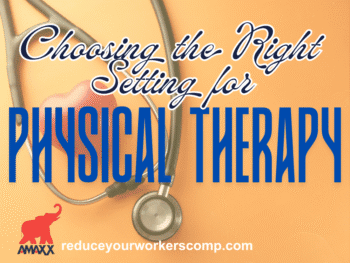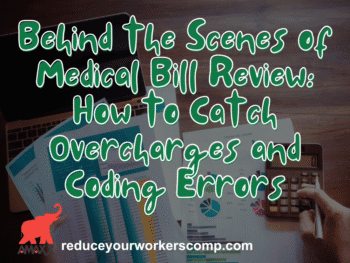
What Medical Bills Do I Need to Pay For?
The first step to understanding when medical expenses are compensable is to understand the statutory requirements in the jurisdiction you are handling. This is especially important for claim professionals that handle multiple states. While this may sometimes require guidance from an attorney, the general rule is that medical bills on admitted claims are compensable if they are “reasonable and necessary” to cure and relieve the effects of a personal injury.
“The 6-Step Process To Determine Workers’ Comp Injury Causation”Click Link to Access Free PDF Download
What Does This Mean?
While some states are moving away from a liberal construction of their workers’ compensation acts, this standard generally means that care is compensable for a myriad of treatment modalities. This can often include care beyond a treating physician and staff, but also include a number of specialists:
- General medical care;
- Psychological and psychiatric care;
- Chiropractic treatment;
- Acupressure and acupuncture;
- Christian Science treatment;
- Podiatric care;
- Surgery, surgical supplies and hospital treatment;
- Diagnostic procedures such as x-rays, EMGs, MRIs and CT-scans;
- Prescription and over-the-counter medicines;
- Durable medical equipment such as braces, crutches, splint, etc.;
- Glasses, Spectacles, Hearing Aids, etc.;
- Artificial members; and
- Various forms of nursing services.
The bottom line in almost all states is that the exposure for medical expense claims on admitted injuries is lifetime medical benefits.
Other Associates Medical Benefits
Most state workers’ compensation acts also provide ancillary benefits for people receiving ongoing medical care and treatment. These benefits include mileage reimbursements, home remodeling or possibly the purchase of a new home.
Tips for Defending Medical Claims
It is important for claim management teams to take a proactive approach to investigate and defend the medical aspect of workers’ compensation claims. This includes claims that are considered “medical only.” These are some important points to consider when dealing with these claims:
-
-
- Change of Physicians Requests. Each jurisdiction has its own rules regarding when and how an injured party can change their primary physician. It is important to know the rules. Part of defending these claims should include being on the lookout for doctors who are known to have an “employee bias,” or have developed a reputation in the medical community to “over-treat.” Be prepared to defend vigorously defend against these changes.
- Medical Fee Schedules and Treatment Parameters. Fee schedules and treatment parameters are established in most states as a mechanism to control the cost of workers’ compensation claims, but at the same time provide quality medical care and treatment for injured employees. It is important to understand these schedules and know what treatment might be excessive or outside the scope of the parameters. It is important to keep this in mind when setting an independent medical examination.
- Independent Medical Examinations (IMEs). Be sure to know the rules and restrictions on IMEs as they vary in each state. It is also important to time your examination in a strategic manner. Be sure to use a doctor from the correct area of medicine and know their credentials. If you are in doubt, obtain a copy of their Curriculum vitae Use only medical doctors with respect in the medical community in order to avoid the “bought and paid for” label that is sometimes attached to IMEs.
-
 Author Michael Stack, CEO Amaxx LLC. He is an expert in workers’ compensation cost containment systems and helps employers reduce their workers’ comp costs by 20% to 50%. He works as a consultant to large and mid-market clients, is a co-author of Your Ultimate Guide To Mastering Workers Comp Costs, a comprehensive step-by-step manual of cost containment strategies based on hands-on field experience, and is the founder & lead trainer of Amaxx Workers’ Comp Training Center, which offers the Certified Master of Workers’ Compensation national designation.
Author Michael Stack, CEO Amaxx LLC. He is an expert in workers’ compensation cost containment systems and helps employers reduce their workers’ comp costs by 20% to 50%. He works as a consultant to large and mid-market clients, is a co-author of Your Ultimate Guide To Mastering Workers Comp Costs, a comprehensive step-by-step manual of cost containment strategies based on hands-on field experience, and is the founder & lead trainer of Amaxx Workers’ Comp Training Center, which offers the Certified Master of Workers’ Compensation national designation.
Contact: mstack@reduceyourworkerscomp.com.
Workers’ Comp Roundup Blog: https://blog.reduceyourworkerscomp.com/
©2021 Amaxx LLC. All rights reserved under International Copyright Law.
Do not use this information without independent verification. All state laws vary. You should consult with your insurance broker, attorney, or qualified professional.




























